




DEDICATION
Dedicated to Terry Fenwick,
whose devotion to the angels inspires me.
Quotations from Scripture are from the Revised Standard Version (Catholic Edition), unless the writers argument depends on a significantly different translation, such as the Septuagint.

2011 Mike Aquilina
All rights reserved. With the exception of short excerpts used in articles and critical reviews, no part of this work may be reproduced, transmitted, or stored in any form whatsoever, printed or electronic, without the prior written permission of the publisher.
ISBN: 978-1-935302-52-0
Book design by A.R.T. Services
Christopher J. Pelicano and Abby M. Pelicano
Printed and Bound in the United States of America.
Saint Benedict Press
Charlotte, North Carolina
2011

CONTENTS
Introduction
 Christians believe in angels. That goes without saying. From the first pages of the Old Testament to the last pages of the New, God speaks of these mysterious beings. They appear as mighty creatures, pure spirits, guarding the gates of paradise, offering purest worship, guiding and protecting Gods people. When God delivers the law, he does so through the ministry of angels. When he delivers his people in battle, it is through the intervention of an angelic host.
Christians believe in angels. That goes without saying. From the first pages of the Old Testament to the last pages of the New, God speaks of these mysterious beings. They appear as mighty creatures, pure spirits, guarding the gates of paradise, offering purest worship, guiding and protecting Gods people. When God delivers the law, he does so through the ministry of angels. When he delivers his people in battle, it is through the intervention of an angelic host.
The Scriptures speak also of fallen angels, who use their phenomenal power to tempt human beings and thwart our salvation.
Angels appear at every moment in the story line of human history. St. Paul explains that in the Old Testament, they act as glorified babysittersguardians and trustees (Gal. 4:1-3)trying their best to keep an unruly people in line. When they appear to the human senses, their form is terrifying. When people see an angel, their immediate response is to fall on the ground in fear and awe (Num. 22:31).
In the New Testament, however, the relationship changes. In the opening chapters of the Gospels of Matthew and Luke, we find angels attending a human birth. We even see an archangel paying homage to a peasant woman of Nazareth, hailing her as full of grace.
Angels appear often in the New Testament, but now as the servants of Jesus Christ, who is true God and true man. Moreover, they appear as servants of those who are in Christ, those who have been changed into his likeness (2 Cor. 3:18) and have come to share in his riches (2 Cor. 8:9). As children of God, we are now heirs of God and fellow heirs with Christ (Rom. 8:17). In every Christian, angels serve the divinized humanity of Jesus Christ.
The first generation lived with an intense awareness of the presence of the angels. In the Acts of the Apostles, Rhodas companions would have been far less surprised by the apparition of an angel than they were by the sudden appearance of St. Peter (Acts 12:11).
This does not mean that the angels are any less powerful in relation to us. Nor does it mean they are any less awe-inspiring. In the Book of Revelation, when St. John encounters an angel, his instinct is to fall down and worship (Rev. 22:8 f ). But the angel lifts him up to stand as his fellow.
This is what Christ has accomplished: the holy communion of heaven and earth, all united in him, all united in worship. Thus, when we go to Mass, we are constantly invoking the angels, because they are present with us, and we sing their songs with them. The Gloria is the song they raised at the birth of Jesus (Luke 2:14). The Sanctus is what they sing at heavens throne (Rev. 4:8).
We should not cease to marvel that the angels are now our fellows. We should not let this truth grow old or grow cold for us.
Consider the fact that you have a guardian angel. Jesus assured us that each of us has one, from our earliest days (Matt. 18:10).
Consider that God has made this person exclusively for your care. Your guardian angel is smarter than a thousand Einsteins, and stronger than any army on earth. And God created him to serve you!
What difference does that make in your life? What difference should it make?
If a human relative or benefactor gave you a sports car, or a half-million dollars, or your dream home, you would find frequent and creative ways to express your gratitude. How often do you thank God for the extraordinary gift of your guardian angel?
And how often do we thank our angels for their care? Remember: angels are persons. To ignore them, after all they do for us, is at least rude, but also daft. Why would we choose not to enter into a close friendship and working relationship with these creatures who are dear to God and far closer to us than our nearest kin?
What sets too many Christians today apart from their ancestors in the faith is our neglect of devotion to the angels. For the early Christians, this was a lively devotion. Thus, for this book I have selected three hundred and sixty-five meditations from the writings of the early Fathers of the Church. Some of it is admittedly speculativeand the Fathers were the first to acknowledge that there were some things about the angels that they couldnt know. But most of it is plain truth, learned from Scripture and taught by the Church. And its all classic Christianity. As such, it demands our attention and cries out for our imitation.
I believe the angels are the great neglected intermediaries in human relationships. How much stronger our families would beour neighborhoods would beour friendships would beour workplace would beour society would beif only we, habitually and silently, called upon the help of the guardian angels of the people who are with us in the course of a day.
In the coming year, lets draw closer to our angels, through prayer and study, as we meet them in the following pages, and as we meet them wherever we go.
How to Use this Book
 I recommend that you set aside a time each day when you can read one of the meditations prayerfully.
I recommend that you set aside a time each day when you can read one of the meditations prayerfully.
Begin with prayer. The traditional prayers to the Holy Spirit are ideal for this purpose. The simple aspiration Come, Holy Spirit will do.
Then read the brief meditation slowly and make the considerations suggested (or think up your own). Try to refer everything to Our Lord; be aware of his presence. When you need help doing this, try calling upon the help of those Fathers who are canonized as saints.
You may close each days reading with the prayer provided. Most of these prayers are adapted from the Churchs ancient liturgies.
A Note on the Texts
The meditations are taken from classic translations of the Fathers. Ive modernized the language to make it more readable, referring back to the original languages when necessary. Because rhetorical styles have changed radically over the centuries, sometimes Ive reduced very long complex sentences to two or more simple sentences. (In the case of Dionysius the Areopagite, I have had to do more extensive condensation and elucidation. His works are difficult. I have taken pains, however, to preserve the original sense of his passages.) Since the page-a-day format places strict demands on space, in some instances Ive abridged passages for length.

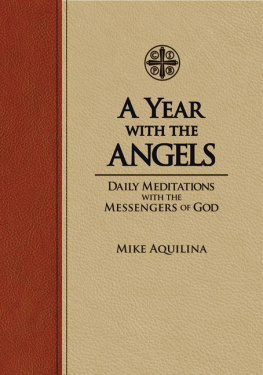
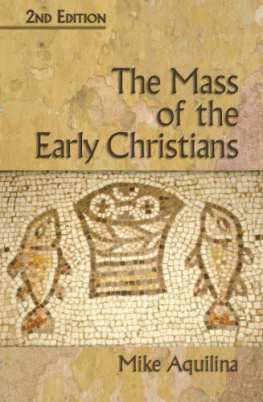
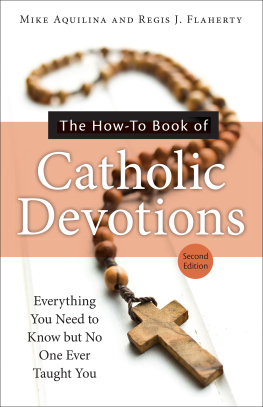
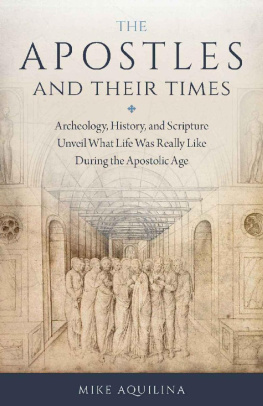


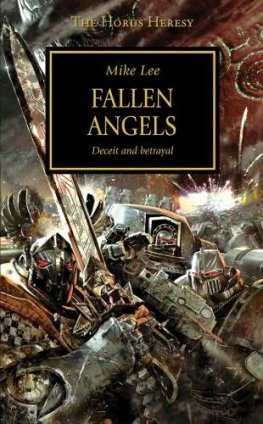

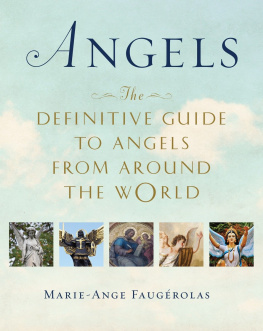
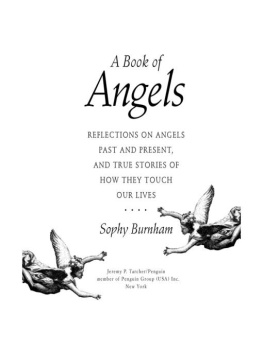



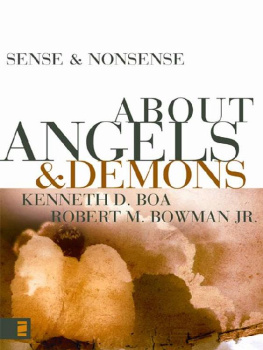
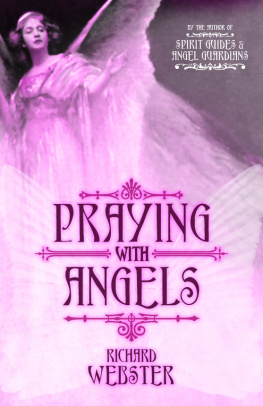
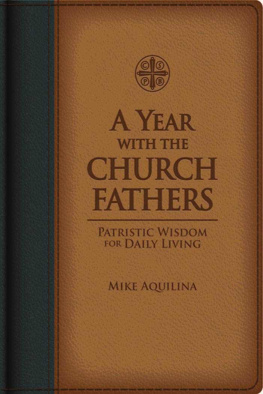







 Christians believe in angels. That goes without saying. From the first pages of the Old Testament to the last pages of the New, God speaks of these mysterious beings. They appear as mighty creatures, pure spirits, guarding the gates of paradise, offering purest worship, guiding and protecting Gods people. When God delivers the law, he does so through the ministry of angels. When he delivers his people in battle, it is through the intervention of an angelic host.
Christians believe in angels. That goes without saying. From the first pages of the Old Testament to the last pages of the New, God speaks of these mysterious beings. They appear as mighty creatures, pure spirits, guarding the gates of paradise, offering purest worship, guiding and protecting Gods people. When God delivers the law, he does so through the ministry of angels. When he delivers his people in battle, it is through the intervention of an angelic host.